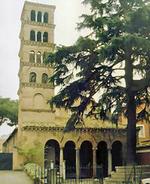Catechism of the Catholic Church
Share this paragraph of the Catechism:
Paragraph:
311 Angels and men, as intelligent and free creatures, have to journey toward their ultimate destinies by their free choice and preferential love. They can therefore go astray. Indeed, they have sinned. Thus has moral evil, incommensurably more harmful than physical evil, entered the world. God is in no way, directly or indirectly, the cause of moral evil. 176 He permits it, however, because he respects the freedom of his creatures and, mysteriously, knows how to derive good from it:
For almighty God. . ., because he is supremely good, would never allow any evil whatsoever to exist in his works if he were not so all-powerful and good as to cause good to emerge from evil itself. 177
Move forward or back a paragraph: Previous | Next
Where this paragraph appears in the Catechism:
TABLE OF CONTENTS
» |
PART ONE: THE PROFESSION OF FAITH |
» |
SECTION TWO: THE PROFESSION OF THE CHRISTIAN FAITH |
» |
CHAPTER ONE: I BELIEVE IN GOD THE FATHER |
» |
ARTICLE 1: "I BELIEVE IN GOD THE FATHER ALMIGHTY, CREATOR OF HEAVEN AND EARTH" |
» |
Paragraph 4. The Creator |
» |
V. GOD CARRIES OUT HIS PLAN: DIVINE PROVIDENCE |
Notes for the above paragraph:
176 Cf. St. Augustine, De libero arbitrio I, 1, 2: PL 32, 1221- 1223; St. Thomas Aquinas, STh I-II, 79, 1.177 St. Augustine, Enchiridion II, 3: PL 40, 236.
English Translation of the Cathechism of the Catholic Church for the United States of America © 1997, United States Catholic Conference, Inc.






